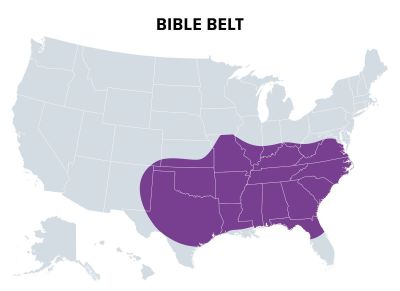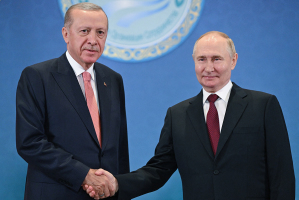Is the Bible Belt the last pillar of hope?

The Bible Belt often receives overtones characterized by pejorative intent. It’s usually identified as a sub-culture of no significant relevancy in a conversation with mainstream culture. However, in the storied history of Christian thought in culture, it has become the last pillar of defense for biblical truth. We believe that the Bible Belt remains a steadfast harbinger of Good News in a culture that has become unimaginably unrecognizable by the traditional Western heritage of philosophy and theology.
Francis Schaeffer once described Western thought as a concatenation of ideas that began with philosophy emanating out of Europe and ended with biblical theology responding in the United States. The chain is mainly institutional and ecclesiastical, but more significantly it’s cultural. Philosophical ideas, argued Schaeffer, influence universities, which influence artistic expression, music, literature, movies, and which coalesce to become mainstream narratives. Not all philosophical ideas are consternating, of course, but many questionable ones become embedded in what Charles Taylor called the “social imaginary” of culture. It’s as if narratives begin to command an aura of legitimacy at the expense of common sense.
To many of us who grew up in the 1970s and 1980s, the above analyses of Schaeffer, particularly in Escape From Reason (1968) and The God Who Is There (1969), were a compelling description of the situation. These books opened our eyes to the slippery slope of the West that is now being experienced. Schaeffer famously described the condition of the West as having crossed over the “line of despair.” By 1984, when he died, postmodern philosophers were turning our Western worldview away from logic, reason, objective morality, Christian tradition, and toward a closed system of thought that emphasized the physical stuff of nature while pressing for unbridled human freedom.
Prior to the postmodern shift in cultural thought, philosophy in the West had always been in conversation with theology. Hard questions gave way to deep and sophisticated answers. This method of correlation served humankind well and helped to maintain the strength and integrity of the Western intellectual tradition.
Since then, something strange has transpired in the West. Philosophy is no longer the quest for truth, beauty, and goodness by engaging in rigorous conversation with Christian thought. Rather, philosophical naturalism is inculcating that it alone is the great revealer of the power structures and covert agendas of all worldviews. There is nothing truly intriguing about philosophy anymore. Philosophy exists on a merely horizontal plane without a vertical axis or theological possibilities. Even if it actually exists anymore, philosophy persists under protest and suspicion. Consequently, all truth claims, whether scientific, moral or religious, and especially our treasured Christian values, are evaluated not by a mindful quest for truth but by cultural narratives.
Consider the current situation or “social imaginary” of our universities in the West. It’s a mind framed by “four-sides”: philosophical naturalism, moral relativism, materialism, and “free-thinking” individualism. All of these positions were seeded in the philosophy of the 19th century and have come to full bloom in postmodernism. In the 1980s and into the 1990s, there were masters of suspicion, such as Michel Foucault and Jacques Derrida. In the 40 years since, we have seen the rise of deconstructionism, Woke ideology, transgender ideology, and the redefining of the traditional family.
The news is not all bad. There remains a vestige of hunger for truth throughout the Western world and even at some major universities. Particularly, the last pillar of defense resides across the Bible Belt of the United States of America. From Liberty University in Virginia to Biola University in California, a clarion call stretches through the heart of the 50 States. There, Western culture is not yet broken and universities are not yet overrun by ideologies inimical to Christian faith and traditional Western values. The worldview of a majority remains intrigued by the quest for truth, goodness, and beauty in the service of faith, grace, hope, and love. Hence the question of this article: “Is the Bible Belt the last pillar of hope?”
Western cultural thought now deems America as the main exporter of cultural influence. Cultural narratives develop in America and then permeate internationally at astonishing speed. Surely, as America exports culture, it also receives bold criticism. Since the 1920s, the Bible Belt has received lopsided cultural caricatures that assessed it from the perspectives of the “four sides” that now permeate Western thought and beyond. The substance of the Bible Belt’s ethos remains relevant, but it should refresh itself by building upon its strong evangelical convictions in order to export influence. Its unique structures should now focus on purposing its Evangelical communication to answer mainstream culture.
Endeavors begins by utilizing its Christian intellectual stock to produce more engagement with the “four sides,” through literature, electronic communications, education, and weekly sermons. The Bible Belt ought to intensify its rational discourse with mainstream culture by employing the indispensability of cultural apologetics. What is that? There are varied definitions. Cultural apologetics is not strictly the utilization of the arts to illustrate biblical truth. Basically, it is the discipline of communicating the relevancy and legitimacy of Evangelical truths by engaging in rational discourse with cultural narratives and trends. It shouldn’t be understood as replacing classical apologetics. Cultural apologetics engages with the ideas emanating especially from the “four sides” that are influencing culture, and then shows how Christian faith remains legitimately relevant.
The undermining of Christian faith has become a notable value in mainstream culture. Our faith is constantly challenged by the flux of cultural narratives coming thick and fast. It is now necessary to not only address how cultural narratives have veered so far from rationality but also to show how the timeless grace of God still applies. Whether we like it or not, all serious-minded Christians living in Western culture will be inevitably dragged into defending the relevancy and legitimacy of their evangelical faith. Kevin Vanhoozer identified this brewing challenge about 17 years ago:
In order to be competent proclaimers and performers of the Gospel, then Christians must learn to read the Bible and culture alike. Christians cannot afford to continue sleepwalking their way through contemporary culture, letting their lives, and especially their imaginations, become conformed to culturally devised myths, each of which promises more that it can deliver: “Do not conform any longer to the pattern of this world, but be transformed by the renewing of your mind” (Rom. 12:2). The apostolic exhortation confronts us with a question: In which cultural world of meaning do we dwell? To what pattern have we conformed our imaginations?[1]
The salient question of our day which captures everyone’s imagination is how to achieve human freedom. Cultural wars ensue because of disagreements on what it means for a human being to be free. The ‘four sides’ cannot provide emotional well-being and ultimate human fulfillment. They never will, because humankind seeks what only its Maker can provide. That provision of grace is now defended in Western culture by the last pillar of hope, the Bible Belt. If this coterie of Evangelical faith were to succumb to cultural pressures, the consequences would be devastating in the Western world and beyond.
1. “What Is Everyday Theology? How and Why Christians Should Read Culture” In Everyday Theology: How to Read Cultural Texts and Interpret Trends, Kevin J. Vanhoozer, Charles A. Anderson, Michael J. Sleasman, eds. (Grand Rapids: Baker Academic, 2007), 15-62.
Marlon De Blasio is a cultural apologist, Christian writer and author of Discerning Culture. He lives in Toronto with his family. Follow him at MarlonDeBlasio@Twitter
Chris L. Firestone, Ph.D. is Associate Executive Vice President and Professor of Christian Worldview at Champion Christian College in Hot Springs, Arkansas. He is also Emeritus Professor of Philosophy at Trinity International University in Deerfield, Illinois, having served there for 25 years prior to Champion. He is married with five children, and resides in Hot Springs, Arkansas.




























